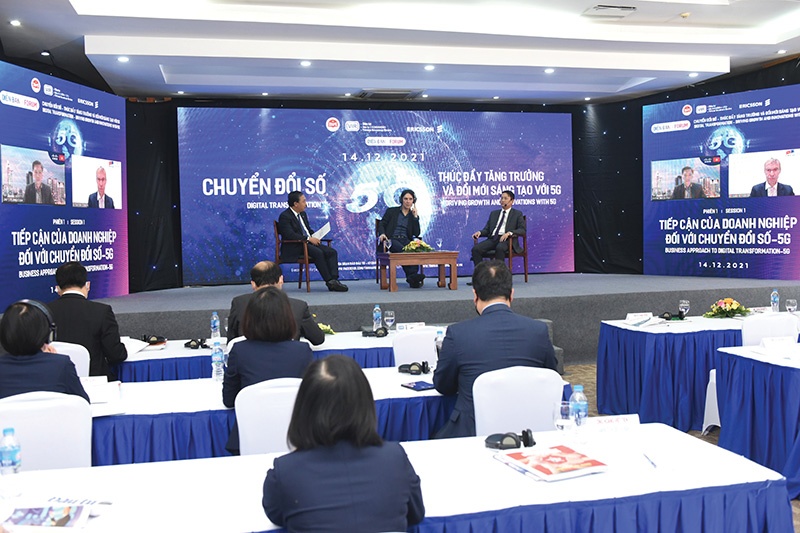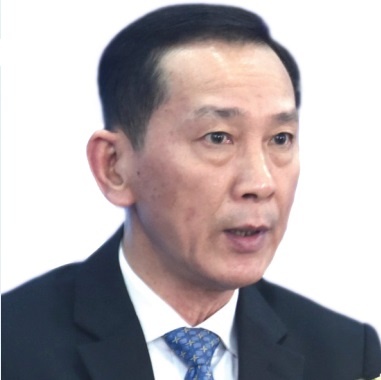Flexibility demanded to pave way for rollout of 5G
 |
| VIR’s forum last week outlined the priorities and potential of the country’s upcoming commercial 5G rollout Photo: Dung Minh |
Nguyen Phong Nha, deputy general director of the Authority of Telecommunications under the Ministry of Information and Communications (MIC), announced at a 5G forum held by VIR last week that the ministry wants to officially licence 5G commercialisation next year to cover high-tech industrial parks and demanding regions, thus enabling Vietnam to be on par with leading nations in 5G.
“The authority will soon work with telecoms units and enterprises to quickly evaluate 5G network trials, while developing criteria for coverage and quality. Solutions will also be forthcoming on sharing infrastructure to save investment costs, increase usage efficiency, and master 5G tech through Vietnamese-made equipment,” he added.
According to Nha, the MIC has directed telecoms units and enterprises to take a variety of measures with the aim of bringing Vietnam’s telecommunications in line with developed countries in terms of development and use of cutting-edge technologies, particularly broadband infrastructure.
The ministry has submitted to the government for the promulgation of Decree No.88/2021/ND-CP on collecting fees for granting the right to use radio frequencies as well as auction, licence, and transfer the right to use them for frequency bands.
“This is critical – it now helps remove bottlenecks in the legal framework for auction, licence, and transfer of radio frequency rights,” Nha noted.
In addition, the ministry has encouraged and instructed mobile network operators to implement a 5G trial in 16 cities and provinces nationwide, nearly tripling the number from earlier this year, with more than 500,000 subscribers and average transmission speed 10 times faster than 4G.
The MIC has also issued specific standards such as national technical regulation on 5G mobile communication base station equipment and terminal equipment; and on the quality of internet access services on 5G terrestrial mobile networks, among others.
Wide coverage
To facilitate the rollout, a method has been built so that all licences will expire in 2024 and frequency bands will be reviewed and planned to suit the current 5G technology and next-gen tech.
Nha noted, “In 2022, the country targets 100 per cent of villages to have access to fibre-optic infrastructure. This is a crucial move for the implementation of radio frequency and quality assurance.”
The announcement is expected to leverage more opportunities for domestic and international tech firms like Viettel, VNPT, MobiFone, Qualcomm, Ericsson, AWS, and others after several changes in the 5G rollout schedule, while enabling the country to further promote the government’s vision of leveraging science, technology, and innovation in driving and creating the next wave of inclusive and sustainable socioeconomic development.
In particular, Ericsson, Qualcomm, ABB, and AWS, with their global scale and expertise, are supporting Vietnam to deploy 5G efficiently. Ericsson is working with partners, app developers, and other ecosystem players to collaborate, innovate, and develop solutions to meet the needs of end customers as well as enterprises in Vietnam.
With commercial consumer-based 5G networks already live around the globe, the next wave of expansion will allow businesses of all types to reap the benefits of enhanced mobility, flexibility, reliability, and security.
However, while anticipating future opportunities, experts, businesses, and policymakers at last week’s forum agreed there remain a lot of issues that need to be addressed soon to ensure a successful rollout.
Early solutions vital
Nguyen Hoa Cuong, deputy director general of the Central Institute for Economic Management, said that to ensure success, some important factors should be taken into consideration such as the telecommunications market and specific services.
“We need to create a competitive telecommunications market with suitable frequency management, thus facilitating 4G and 5G as they require high bandwidth rates,” Cuong said. “It should also create more favourable conditions for telecoms companies and tech firms which face infrastructure charges, compliance fees, and more.”
Hoang Viet Tien, head of Strategic Advisory at Insider - a startup providing marketing technology solutions for big companies in Vietnam, added in terms of telecoms services, expansion is an issue of concern in some areas, especially remote and mountainous ones.
“Moreover, the speed of bandwidth growth has yet to bandwidth consumption,” Tien noted. “The speed of bandwidth increase must be stable to ensure network optimization at all times.”
Other experts said self-contained network infrastructure development among local mobile network operators has been a long-term problem. For 5G, the sharing of infrastructure should be figured out in the early stage of development to save investment costs.
They also explained that the government’s recent strong moves related to 5G and rapid digital transformation is making Vietnam more attractive to foreign investors, driving strategic collaborations in the technology sector. On December 13, Samsung Electronics and Viettel announced the start of 5G commercial trials in the central city of Danang, making it the 11th city to get Viettel’s 5G coverage.
Last month, Viettel alongside Ericsson and Qualcomm recorded a peak transmission speed of 4.7Gb/s using 800MHz of mmWave spectrum in a trial, demonstrating the exceptional capacity of the technology that Viettel is deploying in the country.
Nam Thieu, general director of Qualcomm Vietnam, Cambodia, and Laos, said that activities like these lay the groundwork for the development of smart factories, smart agriculture, smart cities, smart healthcare, and smart education. “This marks an important milestone for Viettel and Vietnam to accelerate 5G commercialisation. It will open new opportunities for Viettel, Qualcomm, and other tech firms to run new business models,” Thieu said.
| Vo Thanh Thong-Deputy Minister of Planning and Investment
With Industry 4.0 having a substantial impact on all aspects of the economy and social life, more opportunities are coming along for each country, organisation, and individual. The Party and the state have outlined orientations for policies and programmes to join Industry 4.0 to accelerate renovation of the growth model and economic restructuring towards stronger and more sustainable development, backed by sci-tech, innovations, and highly-skilled human resources. The Ministry of Planning and Investment has been working with relevant agencies and ministries, especially the Ministry of Science and Technology and the Ministry of Information and Communications, on implementing solutions to accelerate digital transformation and innovation among businesses. They include the key action programmes to develop highly-skilled human resources for the digital economy, build a national innovation centre to develop the startup ecosystem, promote innovations, and support businesses in digital transformation. However, Vietnam is facing many challenges as the country’s participation in Industry 4.0 remains low, while there is a lack of initiatives due to limitations in digital infrastructure. Many businesses remain passive with low capacity in approaching, applying, and developing advanced technologies. 5G is the backbone of the Fourth Industrial Revolution and the commercialisation of 5G mobile networks and universalisation of network services are concrete targets set in the National Strategy on the Fourth Industrial Revolution towards 2030. | |
| Nguyen Hoa Cuong-Deputy director general Central Institute for Economic Management
The Vietnamese telecom industry has developed significantly over a short period of around 15 years and gained a lot of achievements. Vietnam is among the few nations in the region to have a national programme approved by the prime minister on accelerating the digital transformation. The government has devoted significant efforts in institutional building and cooperating with leading telecom groups to establish a miniature ecosystem that would fuel the innovation process. Notably, the use of smartphones has been facilitated to assist mobile operators in developing customer segments, interfaces, and terminals, providing them with a platform to adopt new technologies to improve their service quality. Policymaking should be a fully participatory process, with all stakeholders participating at all phases. To do so, it is crucial to maintain dialogue between state management agencies and enterprises. We expect businesses to speak out about the impact of policies on them. As technology changes rapidly, frequent communication enables state management agencies to keep abreast of the latest industry advancements, thus developing relevant policies to timely assist enterprises. | |
| Christophe Poisson - Representative Digital sector committee European Chamber of Commerce
The world is undergoing a major shift towards the digital era, and Vietnam is taking part in it. 5G will offer an improved response time, with very few delays. This is a crucial advantage that will allow companies to automate tasks that can save time and enable more efficient management of the on-site activity. This is an important competitive advantage and a great opportunity for the development of innovative solutions such as remote machine control. Unlike previous generations of mobile networks, 5G has integrated the energy consumption issue from its conception. It is estimated that 5G will use half of the energy of 4G at launch to transport 1GB of data, and around 10 times less energy by 2025. Finally, 5G’s ability to connect many objects at the same time will enable the development of intelligent systems that will contribute to the environmental goals that modern societies have set themselves, namely, to better consume energy and water and to control our CO2 footprint. | |
| Joseph Perucca-General director GIVI Vietnam
At GIVI Vietnam, we do our best to keep up with the logistical and organisational needs that increasingly need an adequate degree of computerised reporting and digital data. We are deeply connected to the country and develop through digitalising, automating, and computerising alongside our irreplaceable human resources. GIVI Vietnam therefore embraces the era of digitalisation without replacing intellect and human capacity. Examples like covering the roof of our factory with solar panels and producing clean energy have a meaning that goes beyond the simple eco-technological action. It is a lifestyle and a way of thinking and acting and living together in total empathy and respect for others. On Vietnam and its digitalisation path, like many other countries, the effort to be faced is very difficult and it will take a long time to reach an adequate performance. But looking at some small actions, such as apps to report health, is a step towards digital awareness. But it is not just the technology that can make the difference, but the good relationship between it and human beings. | |
| Anatolijus Fouracre - CEO SPS Vietnam
Digital transformation is no longer the buzzword it once was. We are at the forefront of our client digital transformation journeys. Going digital not only allows an enterprise to reduce costs and improve customer service, but it also opens the door to the world of data analytics. Consumer behaviours, spending patterns, and other correlations that previously were completely hidden are now available to explore and leverage. Many companies have been able to take the data from multiple sources and turn it into predictive models to allow for better outcomes. Digital transformation is not just getting rid of paper. It is utilising technology to improve customer service, reduce costs, and gain insights that otherwise would be hidden through the cumbersome processes within the physical workflows. Digital transformation is no longer something that companies can decide to do or not to do. Without digital transformation, companies will simply be outperformed by the competition and swallowed up by those that are already embracing it. | |
| Le Hai Binh - Chairman AXYS Group
As the country aims to raise the proportion of the digital economy in national GDP to 30 per cent and boost productivity by 7.5 per cent annually on average, private enterprises will play a crucial role in realising this target. However, I see that almost all policies to support the business community to promote digital transformation are for startups, while enterprises have yet to find suitable policies, especially in financial supporting packages. AXYS is an example – the company has operated for 20 years, but the company has yet to approach capital support for digital transformation. I see a highlight in policy that can promote enterprises to implement digital transformation. It is the promulgation of the regulation about the use of e-invoices for the sale of goods and services, requiring individuals or household businesses to send an e-invoice to buyers. This policy is considered a big bang for digital transformation, forcing businesses to take at least one footstep into the digital economy. | |
| Matthieu Francois - Associate partner McKinsey & Company
Digital natives are becoming an increasing force in Vietnam’s consumption. People born between 1980 and 2012, including members of Generation Z and millennials, are expected to account for around 40 per cent of Vietnam’s consumption by 2030. Members of this digitally-savvy generation live online and on their mobiles. Almost 70 per cent of Vietnam’s population in 2020 were internet users. Digitalisation is changing the daily channels and communication methods used by Vietnamese people. The rapid emergence of digital consumers has fueled innovation in retail and purchasing behaviour. For example, local social network Zalo is among the most used applications in Vietnam, with 52 million monthly active users, and has become a significant marketing channel. An estimated 55 per cent of Vietnamese Gen Z now use TikTok, driving intense competition, as evidenced in the launch of YouTube shorts and Instagram reels. These new behavioural trends have forced companies to rethink the allocation of their marketing budget. | |
| Ngo Trung Linh-General director Payoo
As a payment intermediary, we are aware that digital transformation is an urgent issue for all businesses, and we will support partners to implement digital transformation such as by supporting the conversion of utility bill payments from traditional methods to electronic payments. Recently, the process of digital transformation and electronic payments has been accelerated, making many businesses unable to delay this process. That is the basis for us to provide payment solutions suitable for each type of customer’s business. We have implemented solutions to support payments with modern methods such as internet banking, QR codes via e-wallet, banking applications, and others. Payoo provides timely support to partners in many industries to help them recover and develop. Payoo also cooperates with Mastercard and retail partners such as AEON Mall, convenience stores, and electronics stores to organise promotions for cashless payments to encourage Vietnamese customers to adopt these methods. |
What the stars mean:
★ Poor ★ ★ Promising ★★★ Good ★★★★ Very good ★★★★★ Exceptional
Related Contents
Latest News
More News
- Masan Consumer names new deputy CEO to drive foods and beverages growth (February 23, 2026 | 20:52)
- Myriad risks ahead, but ones Vietnam can confront (February 20, 2026 | 15:02)
- Vietnam making the leap into AI and semiconductors (February 20, 2026 | 09:37)
- Funding must be activated for semiconductor success (February 20, 2026 | 09:20)
- Resilience as new benchmark for smarter infrastructure (February 19, 2026 | 20:35)
- A golden time to shine within ASEAN (February 19, 2026 | 20:22)
- Vietnam’s pivotal year for advancing sustainability (February 19, 2026 | 08:44)
- Strengthening the core role of industry and trade (February 19, 2026 | 08:35)
- Future orientations for healthcare improvements (February 19, 2026 | 08:29)
- Infrastructure orientations suitable for a new chapter (February 19, 2026 | 08:15)









 Tag:
Tag:



















 Mobile Version
Mobile Version